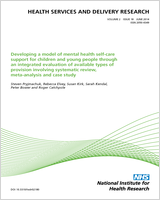Included under terms of UK Non-commercial Government License.
NCBI Bookshelf. A service of the National Library of Medicine, National Institutes of Health.
McLean S, Gee M, Booth A, et al. Targeting the Use of Reminders and Notifications for Uptake by Populations (TURNUP): a systematic review and evidence synthesis. Southampton (UK): NIHR Journals Library; 2014 Oct. (Health Services and Delivery Research, No. 2.34.)

Targeting the Use of Reminders and Notifications for Uptake by Populations (TURNUP): a systematic review and evidence synthesis.
Show detailsMissed hospital appointments are common and costly and can have a negative effect on the health of patients. Hospitals use reminder systems to increase the likelihood of patients attending their appointments. This study looked into which reminder systems work best for which patients with regard to improving attendance, cancellation or rescheduling of appointments. This review included any kind of study investigating any type of system used to remind patients that they have a booked hospital appointment.
The results showed that all types of reminders can reduce non-attendance at health appointments, regardless of the type of appointment or patient groups being treated. Standard reminders should be sent to all patients, unless there is a clear reason not to do so. The reminder can be sent to the patient any time within 7 days of the appointment and it is still likely to be effective. Hardly any studies looked at whether or not certain reminders would be better for certain patient groups. Patients who come from poor communities or ethnic backgrounds, who are addicted to drugs or alcohol, or who have multiple health problems are at a high risk of not attending their appointment. More intensive reminders may help these patients. Many patients never receive their reminder and do not cancel appointments because they have problems getting in touch with the hospital. If it was made easier to contact the hospital, then more hospital appointments could be cancelled and reallocated to another patient. We are developing a practice guideline to help managers to tailor their reminder systems for their service and client groups.
- Plain English summary - Targeting the Use of Reminders and Notifications for Upt...Plain English summary - Targeting the Use of Reminders and Notifications for Uptake by Populations (TURNUP): a systematic review and evidence synthesis
Your browsing activity is empty.
Activity recording is turned off.
See more...